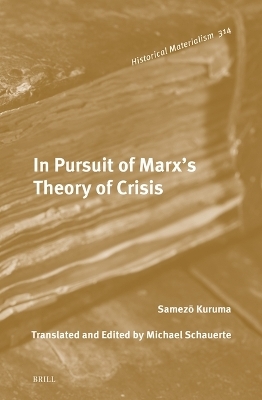
In Pursuit of Marx's Theory of Crisis
Brill (Verlag)
978-90-04-70322-3 (ISBN)
Karl Marx wrote extensively on crisis but never presented a coherent theory of crisis. Samezo Kuruma, a Japanese Marxian economist, aimed to complete Marx’s unfinished theory.
Starting from Marx’s observation that the crises of the world market are the 'real concentration and forcible adjustment of all the contradictions of the bourgeois economy', Kuruma seeks to grasp the inherent contradictions that drive forward and limit capitalism. His focus on the contradictory dynamics of capitalism sets him apart from Marxian thinkers who try to identify a single, primary cause of crisis. This volume brings together all of his writings related to crisis.
Samezō Kuruma, Ph.D (1960), Hosei University, was a professor emeritus at Hosei University, Tokyo, and he was the chief editor of the multi-volume Marx Lexikon zur Politischen Ökonomie (Otsuki Shoten, 1968--1985). Other published works include Keizaigaku shi (History of Political Economy) and Kahei ron (Theory of Money). Michael Schauerte, MA (2001), Hitotsubashi University. Assistant Professor at the University of Miyazaki. Other translations include Marx's Theory of the Genesis of Money (Brill 2018) by Samezō Kuruma, and A New Introduction to Karl Marx (Palgrave 2021) by Ryuji Sasaki.
Acknowledgements
Introduction
Michael Schauerte
1 Bookish Son of a Merchant
2 Aborted Banking Career
3 Creation of Ohara Institute for Social Research
4 Book-Buying Trip to Europe
5 Researching Crisis at the OISR
6 Move to Tokyo and the War Years
7 Postwar Revival
8 Marx-Lexikon zur Politischen Ökonomie
9 ‘A Mere Interpreter of Marx’
10 The Legacy of Kuruma
11 Reading Capital as Crisis Theory
12 A Note on the English Edition
Part 1 History and Overview of Crisis Theory
1 An Introduction to the Study of Crisis
2 An Inquiry into Marx’s Theory of Crisis
3 Addendum to ‘An Inquiry into Marx’s Theory of Crisis’
4 An Overview of Marx’s Theory of Crisis
1 Marx’s General Grasp of Crisis
2 Marx’s Theory of Crisis and Capital
3 Key Perspective When Contemplating Capital as a Theory of Crisis Is to Consider the Developmental Process of Contradictions as a Process Whereby Moments Become Independent
4 Development of the Independence of Moments and the Necessity of Their Real Unity in a Forced and Sudden Form: The Significance of the Explosion, Real Concentration, and Forcible Adjustment of Contradictions
5 Moments Becoming Independent and the Elasticity of the Production Process
6 Some Examples from Capital (and Theories of Surplus Value) of the Emphasis on Moments Becoming Independent
Part 2 Marx-Lexikon zur Politischen Ökonomie
5 Marx-Lexikon Crisis I: Contents and Discussion
1 Part 1: Contents
2 Part 2: Discussion
6 Marx-Lexikon Crisis II: Contents and Discussion
1 Part 1: Contents
2 Part 2: Discussion
7 Marx-Lexikon Crisis III: Contents and Discussion
1 Part 1: Contents
2 Part 2: Discussion
8 Marx-Lexikon Crisis IV: Contents and Discussion
1 Part 1: Contents
2 Part 2: Discussion
Part 3 Reviews, Discussions, and Polemics
9 An Evaluation of Condliffe’s Analysis of Crisis
10 The Contradictions of Modern Wealth
11 Are Prices and Wages in a Vicious Circle?
12 Prices, Currency, and Demand
13 Capital Accumulation and the Depreciation Fund for Fixed Capital
14 A Few Problems concerning Postwar Theories of Crisis
1 ‘Cycle’ (junkan) and ‘Period’ (shūki)
2 On the Theory of ‘Intermediate Crisis’ – Engels’s ‘Mistake’ etc.
15 Tamotsu Takada’s Theory of Accumulation (Part 1 and 2)
1 Part 1
2 Part 2
16 Method for Unfolding a Systematic Theory of Crisis: Critique of Ryozō Tomizuka (Part 1 and 2)
1 Part 1
2 Part 2
Bibliography
Index
| Erscheinungsdatum | 21.08.2024 |
|---|---|
| Reihe/Serie | Historical Materialism Book Series ; 314 |
| Übersetzer | Edward Michael Schauerte |
| Verlagsort | Leiden |
| Sprache | englisch |
| Maße | 155 x 235 mm |
| Gewicht | 940 g |
| Themenwelt | Sozialwissenschaften ► Politik / Verwaltung ► Politische Systeme |
| Sozialwissenschaften ► Politik / Verwaltung ► Politische Theorie | |
| Sozialwissenschaften ► Soziologie | |
| ISBN-10 | 90-04-70322-5 / 9004703225 |
| ISBN-13 | 978-90-04-70322-3 / 9789004703223 |
| Zustand | Neuware |
| Haben Sie eine Frage zum Produkt? |
aus dem Bereich


